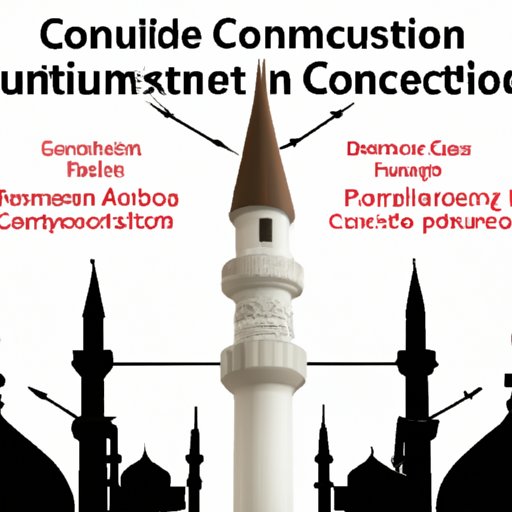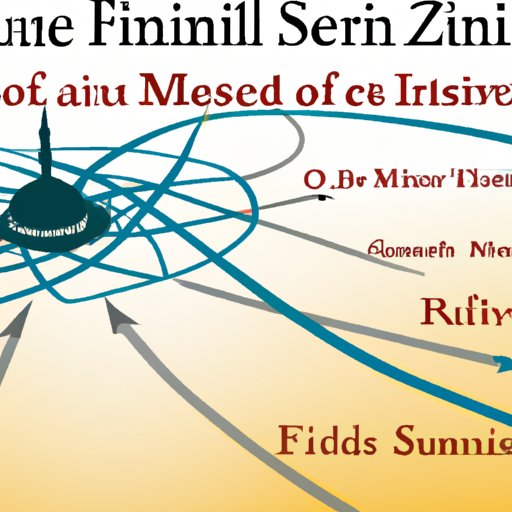Introduction
The expansion of the Islamic faith is one of the most remarkable phenomena in history. In a relatively short period of time, the religion and culture of Islam spread across much of the world. This article will explore the factors that contributed to the rapid expansion of the Muslim culture, from its early beginnings in Arabia to its eventual spread throughout the globe.

Exploring the Islamic Faith and its Expansion
At the heart of Islamic expansion lies the faith itself. Founded by Prophet Muhammad in the 7th century, Islam is based on the teachings of the Quran and Hadith. The Islamic faith is centered around the belief in one God and the importance of being a faithful servant to Him. As such, it emphasizes moral and ethical behavior as well as the importance of social justice.
The influence of Prophet Muhammad was also instrumental in the spread of Islam. He not only preached the faith but also acted as an example of its core values. His actions provided an impetus for people to convert to the religion, making it easier for Muslims to spread their faith.
The development of Islamic law also played an important role in the expansion of the Muslim culture. Islamic jurisprudence provided a legal framework that allowed for the regulation of commerce and other aspects of daily life. This helped to create a sense of order and stability, which encouraged further conversions to the faith.

The Role of Trade and Commerce in Muslim Expansion
Trade and commerce were essential to the success of the Muslim expansion. The earliest Islamic trade networks began in the Arabian Peninsula, where merchants used camels to transport goods across vast distances. These networks quickly spread to other parts of the world, allowing Muslims to establish trading posts in various regions.
The introduction of Islamic currency also had a significant impact on the spread of the faith. Gold and silver coins became widely accepted forms of payment, as they offered more security than other currencies at the time. This facilitated trade and helped to further expand the reach of the Islamic faith.
The development of Islamic banking was another factor that enabled the growth of the Muslim culture. This type of banking system was based on principles of shared responsibility, which made it easier for people to access credit and other financial services. This helped to encourage investment and stimulate economic growth, which in turn enabled further expansion of the faith.
The Militarization of Islamic Expansion
The militarization of the Muslim expansion was also an important factor in its success. After the death of Prophet Muhammad, Islamic empires were formed in various regions of the world. These empires used their military power to conquer new territories and spread the faith even further.
The emergence of caliphates was another key element in the militarization of Islamic expansion. Caliphs were powerful religious and political leaders who acted as guardians of the faith and were responsible for leading military campaigns. This allowed for the rapid expansion of Islamic territory, as well as the establishment of new Islamic laws and customs.
The expansion of the Islamic armies was yet another crucial element in the spread of the faith. Muslim soldiers were often highly trained and disciplined, and they were able to quickly overwhelm opponents and capture new territories. This allowed for the rapid expansion of the faith, as well as the imposition of Islamic laws and customs.

The Role of Conquests in Muslim Expansion
The conquests of Muslim armies played a major role in the expansion of the faith. The early conquests of Arabia saw the spread of Islam to the neighboring regions of Syria, Egypt, and Iraq. From there, Muslim armies continued to expand their territory, eventually conquering lands as far away as India and Spain.
These conquests had a major impact on the cultures of the conquered peoples. Many adopted the Islamic faith and adopted Islamic customs, while others adapted their own beliefs and practices to fit within the Islamic framework. This allowed for the spread of the Islamic culture to many different regions, as well as the development of a unique Islamic identity.
Examining the Spread of Islamic Culture through Education
Education was also an important factor in the spread of the Islamic culture. The establishment of the madrasah system allowed for the teaching of Islamic studies in a structured environment. This enabled students to gain a thorough understanding of the faith, as well as its laws and customs.
Islamic philosophy and science also played a major role in the spread of the faith. Scholars such as Ibn Sina and Al-Ghazali developed sophisticated theories and methods of inquiry that helped to advance the understanding of the Islamic faith. This helped to make the religion more accessible to people outside of the Arab world, allowing for further expansion of the faith.
The development of Islamic art and architecture was also an important factor in the spread of the faith. Islamic artists created beautiful works of art that depicted the beauty of the Islamic culture. This helped to spread the faith to new regions, as well as fostering a greater appreciation for the Islamic faith among those who encountered it.
Analyzing the Impact of Migration on Muslim Expansion
Migration was also an important factor in the spread of the Islamic faith. As Muslims migrated to Europe and North Africa, they brought with them their faith and culture. This allowed for the gradual acceptance of the Islamic faith in these regions, as well as the spread of its culture.
The interactions between Muslims and non-Muslims also played an important role in the spread of the faith. Through these interactions, people were exposed to the teachings of the faith, as well as its laws and customs. This helped to foster a greater understanding of the faith, as well as its values and traditions.
The contributions of Muslims to global cultural exchange were also instrumental in the spread of the faith. Through trade and travel, Muslims were able to share their faith and culture with people from all over the world. This helped to spread the Islamic culture to new regions, as well as encouraging further conversions to the faith.

Examining the Influence of Sufism on Muslim Expansion
The influence of Sufism on the expansion of the Muslim culture should not be overlooked. Sufism is a mystical branch of Islam that emphasizes spiritual growth and inner peace. It has become increasingly popular in recent years, with millions of adherents around the world.
Sufi teachings have helped to spread the Islamic faith in many different ways. By emphasizing the importance of love and compassion, Sufism has helped to counter some of the negative stereotypes associated with the faith. It has also provided a spiritual outlet for many people, which has encouraged further conversions to the faith.
The impact of Sufism on Islamic expansion has been profound. Its emphasis on spiritual growth and inner peace has helped to make the faith more attractive to people from all walks of life. This, in turn, has allowed for the further spread of the faith to new regions and the establishment of a global Islamic culture.
Conclusion
The expansion of the Muslim culture is one of the most remarkable phenomena in history. This article has explored the various factors that contributed to the rapid expansion of the faith, from its early beginnings in Arabia to its eventual spread throughout the globe. The Islamic faith itself, along with its trade networks, conquests, education, migration, and Sufism all played a major role in the success of the Muslim expansion.
The implications of this expansion are still felt today. The Islamic faith remains one of the most influential religions in the world, with millions of adherents around the globe. Its culture and values continue to shape the lives of people in many different countries, and its impact is likely to remain for centuries to come.
(Note: Is this article not meeting your expectations? Do you have knowledge or insights to share? Unlock new opportunities and expand your reach by joining our authors team. Click Registration to join us and share your expertise with our readers.)
